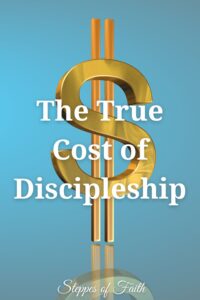
“Because Christ also suffered for us… that you should follow His steps.” (1 Peter 2:21)
As a rabbi, Jesus taught his students how to be proper disciples. But He also endeavored to teach everyone He met what true discipleship entails. Luke 14 records one of these teachings.
Verse 25 says a great crowd, seeking to be disciples, followed Him after He finished preaching in a synagogue. Jesus turned to them and explained that if they wanted to be His disciples, they must do something very unusual.
“26 If anyone comes to Me and does not hate his father and mother, wife and children, brothers and sisters, yes, and his own life also, he cannot be My disciple. 33 So likewise, whoever of you does not forsake all that he has cannot be My disciple.” (Luke 14:26, 33)
This passage is challenging to understand, much less obey, so it is often taken out of context. Much like poking your eye out or cutting off your hand or foot because you sinned (Mark 9:43-48), these types of statements are hyperbole—exaggerated illustrations to help make a point. In Luke 14, Jesus is again using hyperbole.
As a loving God, He would never want us to hate our families. After all, each member is a gift from the Lord and a great blessing to us. So, what does Jesus mean in Luke 14:26?
Don’t Delay
The Bible records several instances when people asked Jesus how they could join His group. Each time, He emphasized the cost of discipleship. One such person was a scribe in Matthew 8. The man insisted he would follow Jesus wherever He went, but Jesus warned him to expect a nomadic lifestyle that relied heavily on others’ hospitality.
“Foxes have holes and birds of the air have nests, but the Son of Man has nowhere to lay His head.” (v20)
A second man then approaches Jesus. He, too, wanted to follow Him, but he wanted permission to bury his father first. Jesus replied, “Follow Me, and let the dead bury their own dead (v22).”
Jesus knew the man’s father was not sick or dying since the expression of burying one’s father was a familiar figure of speech of the time that meant, “Let me wait until I receive my inheritance.” Essentially, the man wanted to wait—potentially years—before he followed Jesus. But Jesus tells us we should never delay our discipleship.
Breaking with family traditions and trusting God’s provision are part of the true cost of discipleship.
Persecution in Discipleship
Just after Jesus fed 5,000 people in Luke 8, He addressed the crowd, explaining more requisites of discipleship.
“23 If anyone desires to come after Me, let him deny himself, take up his cross daily, and follow Me. 24 For whoever desires to save his life will lose it, but whoever loses his life for My sake will save it.” (Luke 9:23-24)
Taking up one’s cross requires daily self-denial and total focus on the Lord. You must be willing to obey His commandments, devote yourself to service, and possibly suffer persecution for your faith. Some may even die for the cause of Christ.
“18 If the world hates you, you know that it hated Me before it hated you. 1 9 If you were of the world, the world would love its own. Yet because you are not of the world, but I chose you out of the world, therefore, the world hates you. 21 But all these things they will do to you for My name’s sake because they do not know Him who sent him.” (John 15:18-19, 21, see also v22-25)
“21 Brother will betray brother to death, and a father his child. Children will rise up against parents and have them put to death. 22 And you will be hated by everyone because of My name.” (Matthew 10:21-22)
True discipleship requires complete devotion to Jesus and to sharing the gospel. Jesus forewarns us that we should expect to be hated for it, sometimes even by our families and friends. They might force us out of our homes, schools, or certain social circles. Sadly, in some places of the world, a father will kill his child if that child chooses to be Jesus’ disciple.
“A man’s enemies will be the men of his own household.” (Micah 7:6)
There is a definite cost to following Jesus. But God encourages us to hold fast to our faith, for our reward is eternal life if we can steadfastly endure.
“1 Let us lay aside every weight and the sin which so easily ensnares us and let us run with endurance the race that is set before us, 2 looking unto Jesus, the author and finisher of our faith.” (Hebrews 12:1-2)

The Gift of Suffering
The apostle Peter knew the challenges of discipleship all too well. In 1 Peter 2, he cautions us about the potential consequences of loyalty to Christ.
“18 Servants, be submissive to your masters with all fear, not only to the good and gentle but also to the harsh. 19 For this is commendable, if because of conscience toward God one endures grief, suffering, wrongfully. 21 For to this you were called, because Christ also suffered for us, leaving us an example, that you should follow His steps.” (1 Peter 2:18-19, 21)
The Greek word for “example” in verse 21 is hupographo (“hoop-ah-graf-oh”). A better translation is “copy” or “pattern.” Jesus—His commands and how He lived and loved—is the pattern we must follow to be faithful disciples. The apostle Paul confirms Peter’s command.
“Therefore, be imitators of God, as beloved children.” (Ephesians 5:1)
Notice that Peter instructs that suffering for the sake of Christ is commendable. Paul again confirms Peter in the book of Philippians, using the word “granted.”
“For it has been granted to you that for the sake of Christ, you should not only believe in him but also suffer for his sake.” (Philippians 1:29)
In the original Greek, “granted” (charizomai, “khar-id’-zom-ahee”) is translated from the Greek noun for grace (charis), which means to bestow or give willingly. Paul reminds us that suffering for Jesus’s sake is a “gift of grace” (Gr, charisma) for it produces power and joy for the believer.
“But may the God of all grace, who called us to His eternal glory by Christ Jesus, after you have suffered a while, perfect, establish, strengthen, and settle you.” (I Peter 5:10)
“But rejoice to the extent that you partake of Christ’s sufferings, that when His glory is revealed, you may also be glad with exceeding joy.” (1 Peter 4:13)
Since Jesus suffered for our sins on the cross and endured unjust affliction, we must also be willing to endure unjust affliction and grief for our faith. According to Peter, it is commendable because we know we are ultimately in God’s sovereign care.
More Discipleship Requirements
The Bible tells us some of the other requirements of true discipleship.
Abiding: “If you abide in My word, you are truly My disciples.” (John 8:31)
Love: “By this, all people will know that you are My disciples, if you have love for one another.” (John 13:35)
“Walk in love, as Christ loved us and gave himself up for us.” (Ephesians 5:2)
Setting Ourselves Apart: “Training us to renounce ungodliness and worldly passions, and to live self-controlled, upright, and godly lives in the present age, waiting for our blessed hope.” (Titus 2:12)
Bearing Good Fruit: “By this, my Father is glorified, that you bear much fruit and so prove to be my disciples.” (John 15:8)
Serve Others: “14 If I then, your Lord and Teacher, have washed your feet, you also ought to wash one another’s feet. 15 For I have given you an example, that you also should do just as I have done to you.” (John 13:14-15)
There are many requirements to being Jesus’ disciple, but He gives us the most unusual one in Luke 14.

The Meaning of Hate
“If anyone comes to Me and does not hate his father and mother, wife and children, brothers and sisters, yes, and his own life also, he cannot be My disciple.” (Luke 14:26)
Jesus makes a similar statement in Matthew 10:37.
“He who loves father or mother more than Me is not worthy of Me. And he who loves son or daughter more than Me is not worthy of Me.”
Why would Jesus say we must hate our families? Jesus’ demand would have been highly offensive to a first-century Jewish audience that prized hospitality. To them, honoring one’s parents was their greatest commandment. Even in today’s Western culture, a command to hate our families does not sit well. After all, the Scriptures tell us in many places that we are to honor, protect, and love others. This is why Jesus’ words are so difficult to understand.
The Greek translation for the word “hate” is miseo (“mih-SEH-oh”). As the opposite of absolute love (“agapeo”), hate indicates having little or no care or compassion for others. It also implies feelings of hostility and wishing harm or even death.
But another (and better) translation of miseo is not to detest or wish harm but to “love less.” Jesus’ statement, therefore, is best understood as the willingness to love Him above all else. We must develop such an enormous devotion to Him that our care for others would seem more like hatred by comparison.
Discipleship and the Cross
Jesus then tells us to hate something other than our families. In verse 27 of Luke 14, He continues, saying, “And whoever does not bear his cross and come after Me cannot be My disciple.” Jesus is referring to the excruciatingly painful and most humiliating form of execution ever created.
In the Roman process of crucifixion, the condemned person would carry a heavy, horizontal beam (the patibulum) on his shoulders to the site of his execution. Typically, the death march went through the town’s busiest streets, where huge mob-like crowds would subject the person to intense humiliation, taunts, spitting, and mockery. Bearing our cross means we must have a total commitment to God, even if it means persecution and physical death.
Taking verses 26 and 27 together, Jesus challenges us to a level of devotion that few are willing to attain.
We must put Him first in every area of our lives. He must be the only one on the throne, and we must be completely sold out to Him, willing to give everything to Him, including our lives. In turn, we obey His word, abide and trust in His love and faithfulness, bear good fruit in our works and behavior, culturally set ourselves apart from the world, and serve and love others with intentionality.
This is the cost of true discipleship.
More about Christian Discipleship: The Meaning and Cost of Following Jesus

This read was amazing. It basically, in a good way, let me know how short I was in my discipleship. I personally have some soul searching to do, and deepen my faith walk.
I’m glad it was a blessing to you, David. I pray God builds you up for the good work He has for you.